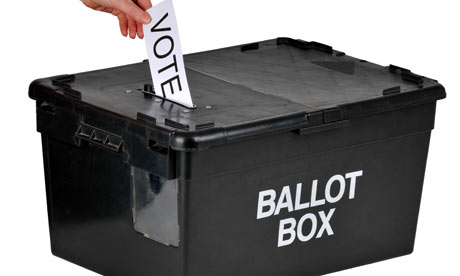Today is polling day in the UK, millions will be voting in local elections and referenda. The French are currently voting for their next president and Americans will be doing likewise in the autumn.
But on an individual level, why do we all bother?
 |
| caphttp://static.guim.co.uk/sys-images/Guardian/About/General/2010/4/2/1270211485928/A-ballot-box-001.jpg |
We tend to do stuff (in life generally) if the expected benefits outweigh the expected costs. But the expected benefits of voting are basically zero, and the costs aren’t negligible. Your benefit from voting depends on whether your vote influences the outcome of the election. We can crudely estimate your benefit from voting by multiplying the probability that your vote will change the election outcome by the benefit you would gain from your preferred candidate winning. But the probability of you being the decisive voter is TINY (even in marginal constituencies). Thus the benefit from voting is negligible.
Given that there will be a cost to you of voting (taking time to think about policies and go to the polling station etc) we can rightly pose the question: why do we, rational, intelligent human beings, bother voting?
“The rationality of voting is the Achilles’ heel of rational choice theory” (Aldrich, 1997)
Many have attempted to answer that question by adding another ingredient into the mix: the direct benefit to you from voting, irrespective of who wins. This solves the puzzle. Or does it? Without adequately explaining exactly what this direct benefit is and what causes it, all we have is a typical economics fudge.
Some have suggested that the direct benefit is the knowledge that we are fulfilling our civic duty, or that we value being able to voice our opinions, even if it won’t change the election outcome.
One economist, Patricia Funk (2010), thought that the social pressure to vote might have an impact. She analysed the effect of introducing postal voting in Switzerland. Postal voting reduces the social pressure to vote (as you do not have to be seen down the polling station by your community). If this hypothesis is correct then we would expect to see the absence of postal voting lowering turnout in small communities more than in large ones (as everybody knows everybody in a small village etc). This is what she observed. However, there has to be more to puzzle than social pressure, as most people still voted using postal votes.
I will be voting later this evening, and I encourage all you (who can) to do so too. Personally, I think the civic duty suggestion is most accurate but I would be interested to hear your thoughts.
So, why did you/will you vote today?
Social pressure, civic duty or something else?
Please leave a comment...
Recommended listening:
Sunny Afternoon by The Kinks
Because, if someone does not use their vote, even just to spoil a vote or to vote for a minority, I believe they should have no right to complain about what's happening!
ReplyDeleteSo our right to freedom of speech is dependent upon our use of our right to vote?
ReplyDeleteYou're right Tim, votes are worth next to nothing, which is why there is no point in voting. And Ed, do you think that people who complain and don't vote will stop because of your argument? Hardly.
ReplyDelete